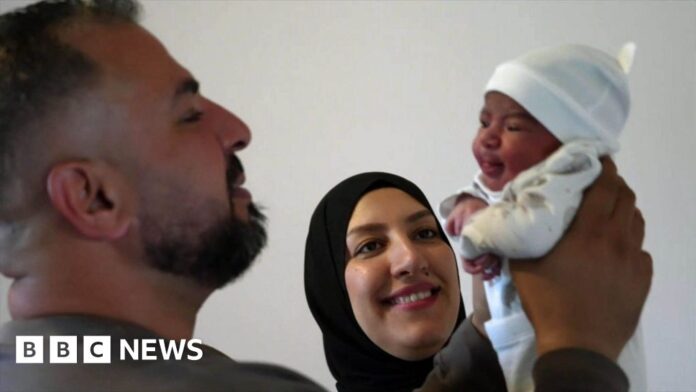Andrew HardingReporting from Rouvroy, northern France
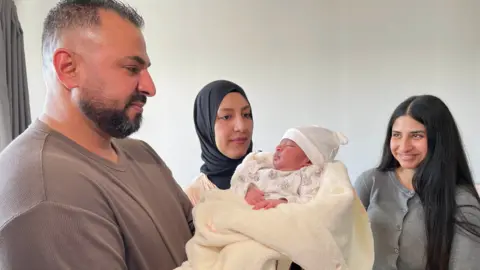 BBC
BBCFirst came an email. Then, a month later, a baby.
Each arrival, in its own way, marked a sharp swerve in the fortunes of a grief-bludgeoned Iraqi family that has spent the past 15 years darting around Europe in a state of legal limbo. Unable to secure asylum, or to work legally, or to call anywhere home.
The Alhashemi family scraped the depths of misery in April 2024. Threatened with imminent deportation from Belgium to Iraq, they attempted to cross the English Channel in a small boat. Their seven-year-old daughter, Sara, died in a suffocating crush onboard – an incident we witnessed from a French beach.
A little more than a year later, a life-changing email from an official French refugee agency reached the family at their temporary accommodation in Rouvroy. It is a quiet town surrounded by World War One memorials and by the tall coal slag heaps that litter this stretch of northern France. The far-right French politician, Marine Le Pen, is a local MP.
“We know our path now,” says Ahmed Alhashemi, 42, scrolling through the email, a small smile breaking across his careworn face.
Across the hallway, in her bedroom, his oldest daughter, Rahaf, 14, writes in a neat notebook, carefully practising her fourth language, French.
“It’s pretty hard. I can understand more than I can speak,” she says in fluent English, her third language after Swedish and Arabic.
Asylum repeatedly denied
Ahmed and his wife, Nour, 35, met in Belgium when they were in their 20s, having both fled Iraq. Nour says she and her brothers and sisters had to leave because of their family’s ties to Saddam Hussein’s deposed regime. Ahmed fled because of alleged death threats from a local militia.
Nour’s siblings quickly moved to Sweden, where they were all granted asylum. But Nour stayed back because she had met Ahmed at a relative’s home in Antwerp, and was immediately struck by his calm, considerate demeanour.
“It was love,” she acknowledges with a sad smile, that stopped her from following her siblings to Sweden.
“If I’d gone with them, my entire life would have changed. It might be my fate, or destiny,” she says.
Instead, a different life unfolded. The couple applied for asylum in Belgium, were married there and went on to have three children – daughters Rahaf and Sara, and a son called Hussam.
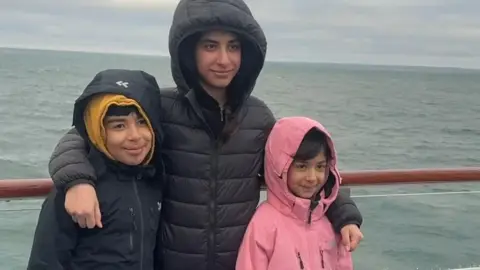
The family did eventually make their way, via Finland, to Sweden because they were denied the right to stay in Belgium. But early last year, they were told that they had to leave Sweden too.
European immigration officials had repeatedly ruled that their home city of Basra, in southern Iraq, was no longer a war zone and their requests for asylum were all declined.
But Nour and Ahmed insisted that their lives would be in danger if they were deported back to Iraq – a country that their children had never known.
“If we thought we could actually live [safely] in Iraq, we would have gone a long time ago,” says Nour.
Convinced they might soon be forced to return to Basra, Ahmed reached out to an Iraqi Kurdish smuggling gang and paid them €5,250 (£4,576) to transport the family by small boat to England, where some of their relatives were already living.
Early on 23 April last year, I was waiting with BBC colleagues on Wimereux beach, when we spotted a smuggling gang battling against French police. Moments later, in the early dawn light, we saw a man hoist a child onboard an inflatable boat. The girl was seven-year-old Sara. As more people clambered onboard, she became trapped beneath her father’s legs and suffocated in the dark, along with four other people.
“I will never forgive myself. But the sea was the only chance I had,” Ahmed told me soon afterwards.
A fortnight later, Sara was buried in a cemetery in the nearby city of Lille.
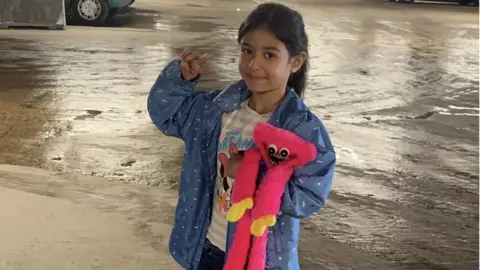
The family was quickly moved to a migrant transit hostel in a tiny village south of Lille. There were no shops and little public transport. Other migrants spent only a night or two at the centre before leaving – often to head back to the coast to attempt another crossing. The Alhashemis remained there for almost a year.
We first visited the family at the hostel in May last year. Sara’s sister, Rahaf, spoke tearfully of her yearning for a “normal” life. She had stayed in touch with school friends from Sweden where she had flourished, winning prizes for ice-skating.
As the months began to slip by, it appeared that the Alhashemi family had become trapped in the eddies of a bureaucratic whirlpool, struggling to get the children into a local school, to receive any sort of financial support or to leave the crowded hostel.
Weighed down by grief, Nour struggled to leave her bed.
“I ate there. I slept there. I sat there. I just didn’t have the energy to get out of that routine,” she says.
“It was the worst year of my life.”
The hostel’s rapid turnover of new migrants left the children reeling, and Nour haunted.
“Whenever new (migrants) arrived, they wanted to talk about the sea, how they got there, who they came with. I didn’t want anyone to ask me questions or to hear anything,” she says. She compares the hostel to a prison.
The family applied for asylum in France soon after Sara’s death.
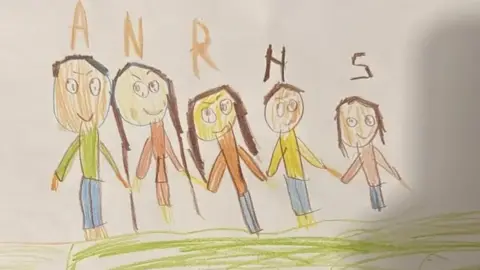
According to EU rules (the Dublin Convention), they could have been sent back to Belgium, where Ahmed was first registered as an asylum seeker and where they’d already been told they faced imminent deportation to Iraq. That didn’t happen – possibly because the French authorities took pity on them after Sara’s death. But it still took a legal challenge, and many months, for the family to secure schooling and other assistance in France.
“It’s like a labyrinth. They’re trapped by the procedures,” says Claire Perinaud, a French lawyer who has been helping the Alhashemis.
“There’s no doubt they were entitled to get help as asylum seekers.”
She describes the complex regulations, the struggles to book appointments and the difficulties facing those unable to speak French.
“All those laws and obstacles are made, in a way, to prevent people to come [as if] to say, ‘you’re not welcome’,” she says.
But in March 2025, the family were finally moved to their own two-bedroom apartment in a social housing unit in Rouvroy.
Rahaf immediately set up what she called “a shrine” to her sister Sara, with photographs and mementoes, including her watch, carefully laid out on a bookcase.
“I can breathe now,” Nour says when we visit, her hand on her neck.
At that time the couple still dreamed about reaching Britain, where they have other relatives. But not by small boat.
“Never,” Nour tells me, firmly.
Then, on a summer’s day in late July, a long-awaited email from the French authorities arrived in Ahmed’s inbox.
It explained that he and his children had been granted provisional asylum and permission to remain in France for the next four years. Nour has been told she will receive the same news soon. After that, they will all be able to apply for permanent residency, paving the way towards French citizenship.
‘Now I can help my children achieve their dreams’
“Ca va?” says Ahmed, testing out his shaky French, with a grin, as he welcomes us at the entrance of the apartment block, a few weeks later.
It is a warm Monday morning in early September, with shouts and songs drifting across the parking lot from the nearby primary school.
Upstairs, sitting on her bed and glancing at a poem by Victor Hugo, Rahaf contemplates the fact that her future is secure for the first time in her entire life.
“I was worried we were going to get expelled. But now I’m happy we’re settled here in France,” she says.
Ahmed, a tiler by trade, is already making plans to open his own small company and has been applying for jobs in the meantime. Nour would like to open her own bakery.
“We have suffered for 15 years. Always on the move,” says Ahmed.
“But now I feel as if my whole life has opened before me. I can work, I can rent, I can pay taxes, and I can help my children achieve their dreams.”
And there is another reason for the tangible sense of optimism now surging around their apartment.
“It was so quiet before,” says Rahaf with a grin, at the sound of a crying baby in the living room.
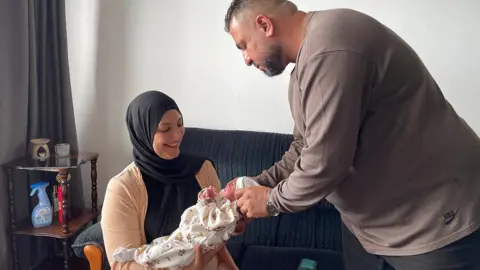
Not long before our latest visit, Nour gave birth to a healthy baby girl. Rahaf had wanted to name her Lara, but the family agreed on Sally. Both carried deliberate echoes of the child they had lost.
Months ago, Nour had worried it was “too soon” for another baby. But now she beams with delight at the presence of a new girl in the family. “It means I can see Sara in her,” she says, wiping away a tear. “God willing, Sally will be lucky in life and achieve everything that Sara might have done.”
And with that, Nour places Sally in her pram and takes her outside, past the school, for her very first trip around their neighbourhood.
There will be some, reading this, who will disagree, perhaps sharply, about the choices the Alhashemis have made in recent years. Ahmed has already faced furious criticism online for risking the lives of his children in a small boat.
But after so many years of uncertainty and regret, the family now have what so many others still crave – a sense of stability, and a safe place to call home.


